Benjamin Ruppik
Emotionally Intelligent Task-oriented Dialogue Systems: Architecture, Representation, and Optimisation
Jul 02, 2025Abstract:Task-oriented dialogue (ToD) systems are designed to help users achieve specific goals through natural language interaction. While recent advances in large language models (LLMs) have significantly improved linguistic fluency and contextual understanding, building effective and emotionally intelligent ToD systems remains a complex challenge. Effective ToD systems must optimise for task success, emotional understanding and responsiveness, and precise information conveyance, all within inherently noisy and ambiguous conversational environments. In this work, we investigate architectural, representational, optimisational as well as emotional considerations of ToD systems. We set up systems covering these design considerations with a challenging evaluation environment composed of a natural-language user simulator coupled with an imperfect natural language understanding module. We propose \textbf{LUSTER}, an \textbf{L}LM-based \textbf{U}nified \textbf{S}ystem for \textbf{T}ask-oriented dialogue with \textbf{E}nd-to-end \textbf{R}einforcement learning with both short-term (user sentiment) and long-term (task success) rewards. Our findings demonstrate that combining LLM capability with structured reward modelling leads to more resilient and emotionally responsive ToD systems, offering a practical path forward for next-generation conversational agents.
Infusing Emotions into Task-oriented Dialogue Systems: Understanding, Management, and Generation
Aug 05, 2024

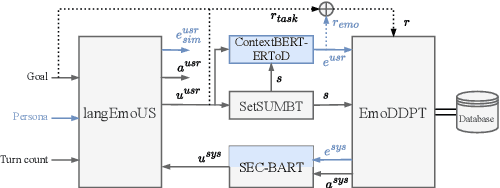
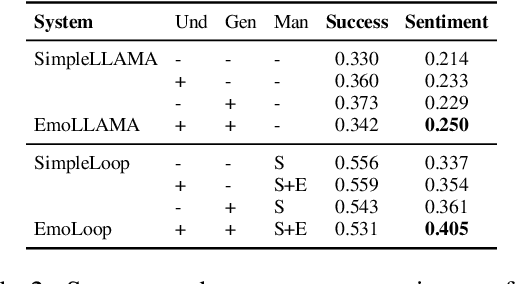
Abstract:Emotions are indispensable in human communication, but are often overlooked in task-oriented dialogue (ToD) modelling, where the task success is the primary focus. While existing works have explored user emotions or similar concepts in some ToD tasks, none has so far included emotion modelling into a fully-fledged ToD system nor conducted interaction with human or simulated users. In this work, we incorporate emotion into the complete ToD processing loop, involving understanding, management, and generation. To this end, we extend the EmoWOZ dataset (Feng et al., 2022) with system affective behaviour labels. Through interactive experimentation involving both simulated and human users, we demonstrate that our proposed framework significantly enhances the user's emotional experience as well as the task success.
CAMELL: Confidence-based Acquisition Model for Efficient Self-supervised Active Learning with Label Validation
Oct 13, 2023Abstract:Supervised neural approaches are hindered by their dependence on large, meticulously annotated datasets, a requirement that is particularly cumbersome for sequential tasks. The quality of annotations tends to deteriorate with the transition from expert-based to crowd-sourced labelling. To address these challenges, we present \textbf{CAMELL} (Confidence-based Acquisition Model for Efficient self-supervised active Learning with Label validation), a pool-based active learning framework tailored for sequential multi-output problems. CAMELL possesses three core features: (1) it requires expert annotators to label only a fraction of a chosen sequence, (2) it facilitates self-supervision for the remainder of the sequence, and (3) it employs a label validation mechanism to prevent erroneous labels from contaminating the dataset and harming model performance. We evaluate CAMELL on sequential tasks, with a special emphasis on dialogue belief tracking, a task plagued by the constraints of limited and noisy datasets. Our experiments demonstrate that CAMELL outperforms the baselines in terms of efficiency. Furthermore, the data corrections suggested by our method contribute to an overall improvement in the quality of the resulting datasets.
From Chatter to Matter: Addressing Critical Steps of Emotion Recognition Learning in Task-oriented Dialogue
Aug 24, 2023
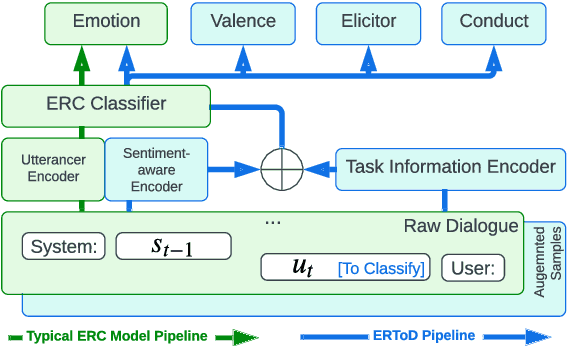
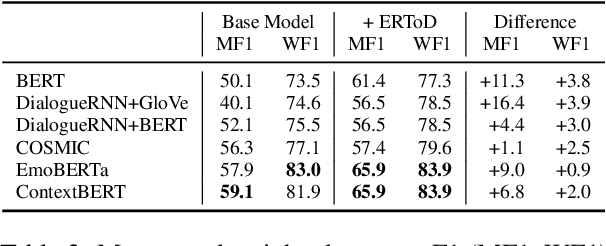
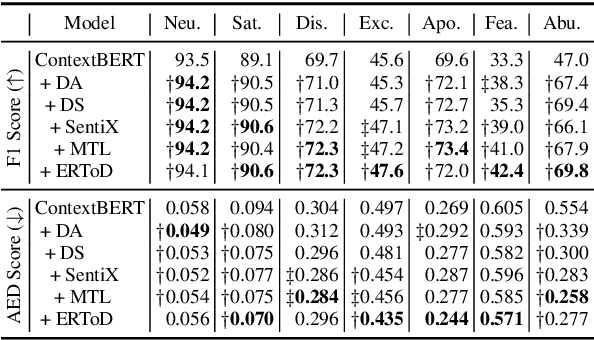
Abstract:Emotion recognition in conversations (ERC) is a crucial task for building human-like conversational agents. While substantial efforts have been devoted to ERC for chit-chat dialogues, the task-oriented counterpart is largely left unattended. Directly applying chit-chat ERC models to task-oriented dialogues (ToDs) results in suboptimal performance as these models overlook key features such as the correlation between emotions and task completion in ToDs. In this paper, we propose a framework that turns a chit-chat ERC model into a task-oriented one, addressing three critical aspects: data, features and objective. First, we devise two ways of augmenting rare emotions to improve ERC performance. Second, we use dialogue states as auxiliary features to incorporate key information from the goal of the user. Lastly, we leverage a multi-aspect emotion definition in ToDs to devise a multi-task learning objective and a novel emotion-distance weighted loss function. Our framework yields significant improvements for a range of chit-chat ERC models on EmoWOZ, a large-scale dataset for user emotion in ToDs. We further investigate the generalisability of the best resulting model to predict user satisfaction in different ToD datasets. A comparison with supervised baselines shows a strong zero-shot capability, highlighting the potential usage of our framework in wider scenarios.
EmoUS: Simulating User Emotions in Task-Oriented Dialogues
Jun 02, 2023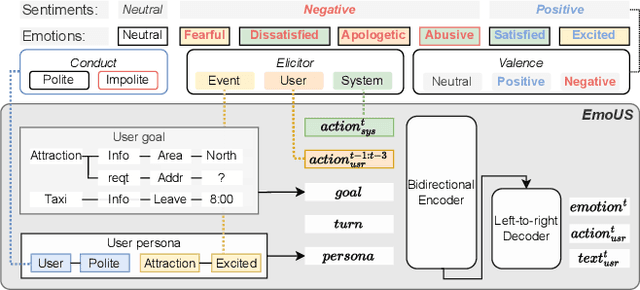
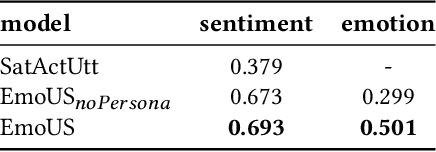


Abstract:Existing user simulators (USs) for task-oriented dialogue systems only model user behaviour on semantic and natural language levels without considering the user persona and emotions. Optimising dialogue systems with generic user policies, which cannot model diverse user behaviour driven by different emotional states, may result in a high drop-off rate when deployed in the real world. Thus, we present EmoUS, a user simulator that learns to simulate user emotions alongside user behaviour. EmoUS generates user emotions, semantic actions, and natural language responses based on the user goal, the dialogue history, and the user persona. By analysing what kind of system behaviour elicits what kind of user emotions, we show that EmoUS can be used as a probe to evaluate a variety of dialogue systems and in particular their effect on the user's emotional state. Developing such methods is important in the age of large language model chat-bots and rising ethical concerns.
ChatGPT for Zero-shot Dialogue State Tracking: A Solution or an Opportunity?
Jun 02, 2023
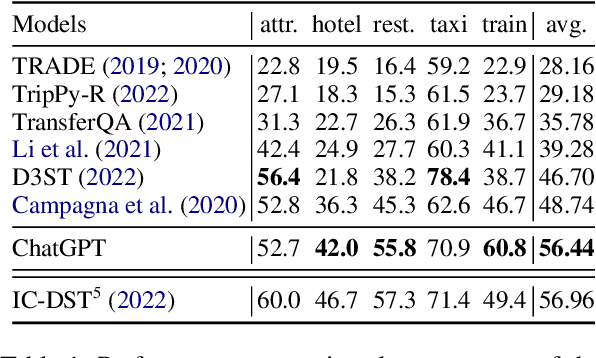
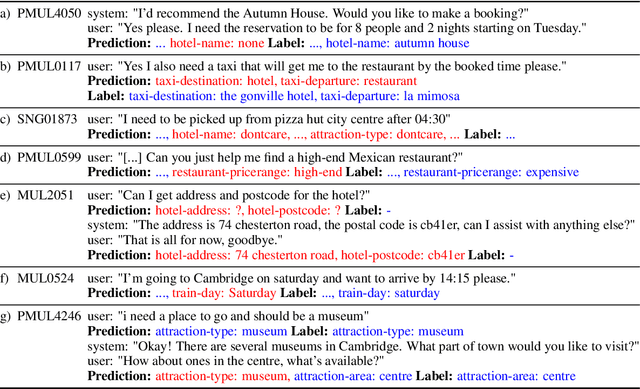
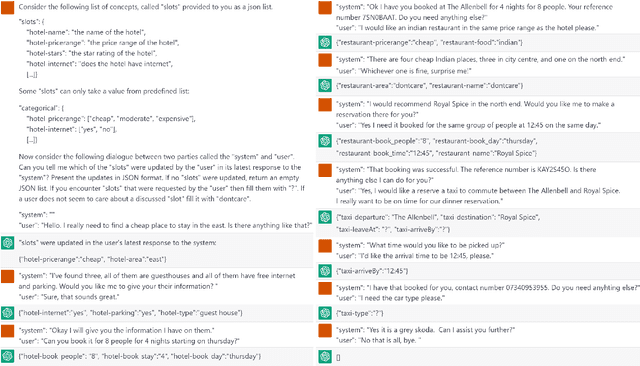
Abstract:Recent research on dialogue state tracking (DST) focuses on methods that allow few- and zero-shot transfer to new domains or schemas. However, performance gains heavily depend on aggressive data augmentation and fine-tuning of ever larger language model based architectures. In contrast, general purpose language models, trained on large amounts of diverse data, hold the promise of solving any kind of task without task-specific training. We present preliminary experimental results on the ChatGPT research preview, showing that ChatGPT achieves state-of-the-art performance in zero-shot DST. Despite our findings, we argue that properties inherent to general purpose models limit their ability to replace specialized systems. We further theorize that the in-context learning capabilities of such models will likely become powerful tools to support the development of dedicated and dynamic dialogue state trackers.
 Add to Chrome
Add to Chrome Add to Firefox
Add to Firefox Add to Edge
Add to Edge